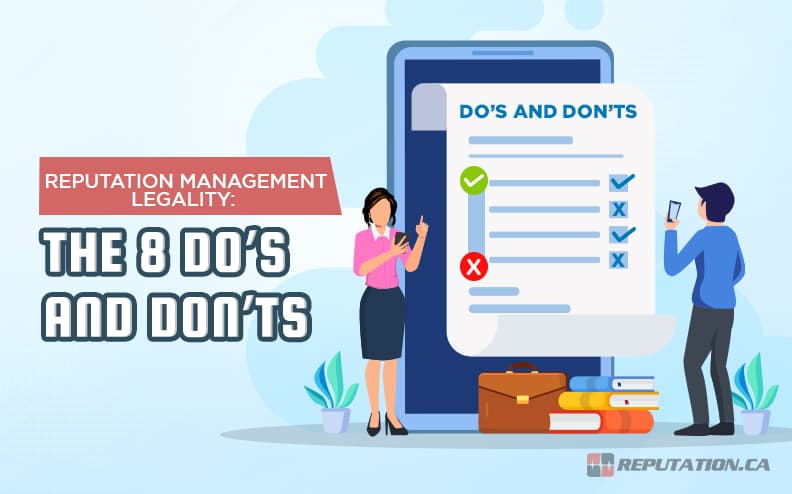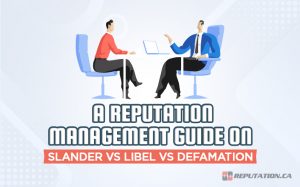We must spend a great deal of time cultivating our public image to ensure we do not incur the ire of those around us. For the average individual, maintaining a public image is about avoiding controversy that might alienate them from friends, family, and employers. Corporate entities spend the most time on protecting their public image since a poor reputation costs them business.
Modern society operates on the near-instant communication provided by information technology, allowing us to reach millions worldwide. This advanced communication has affected reputation management for companies and individuals. The rapid transmission of information has led to a surge in reputation management to preserve the public image of people and companies.
While reputation management is slowly becoming a major field, there are restrictions involved in the industry. The efforts that go into preserving your reputation must align with state and federal law, or you risk damaging more than your image. While the restrictions on self-promotion and reputation marketing are not overly complex, other details are essential to legally manage your image.
It can be difficult to navigate the many details that impact our public image while operating within the law’s bounds. Fortunately, there are a few do’s and don’ts that you can adhere to and minimize the risk of violating the law. Understanding these restrictions could be essential to your efforts.
DO: Exercise Your Freedom of Speech
While this might seem like trite advice for any individual or company, remaining true to your federal rights to freely express yourself cannot be forsaken. For our neighbors in the United States, this freedom is protected by the First Amendment of the United States Constitution. Here in Canada, the right is protected by section 2 of the Canadian Charter of Rights and Freedoms.
Regardless of your country, the basic principle remains the same. Every citizen and entity retains the right to freely express their opinions and views as they please, with virtually no restrictions. This means there is virtually nothing the government can do to prevent you from making public statements to get information about you or your company out there.

Certain restrictions are in place to protect certain demographics, but these restrictions only prohibit illegal content. We will cover more about what is considered illegal content later, but aside from these details, you are free to make statements as you see fit. Unless a law enforcement official provides a valid reason for you not to say or post something or you are going to post something clearly illegal, you do not have to stop. Though it is important to remember that the First Amendment does not extend to privately managed platforms like Facebook or Yelp. Unfortunately, there is more to consider when attempting to manage your reputation.
DO NOT: Make a Post or Statement Using Illegal Content
The term “illegal content” might seem like an odd qualifier for reputation management, but it needs to be considered. Most reputational campaigns are performed using online mediums like social media or personal websites to maximize the potential audience. Typically, this means you post statements or content to draw attention to you or your industry. While this is common practice, you must avoid using content that victimizes another person or group. While you likely do not need to be told to avoid posting content that depicts children in compromised positions, there are some concerns that you might post jocularly.

It is completely illegal to make a post with statements or content threatening violence on others or encouraging your viewers to inflict violence. Such posts might not be intentional, but viewers can take a comment as a call to arms against your critics. Some people might willingly use their viewers as a personal army, but such action is illegal and can result in intervention from law enforcement officials.
While not strictly a legal concern, using social media platforms to advertise yourself or your business has become extremely common. We mentioned before that social media platforms are not beholden to First Amendment or Canadian Charter regulations since they are privately owned. While the platforms must adhere to certain federal regulations like everyone else, most of the content permitted on their platform is regulated by the platform’s terms of service. These terms regulate the content their users are permitted to post, and violating them could lead to your account being removed. The legal side arises if the content violates the platform’s terms of service and your country’s federal laws.

If your post violates federal laws, the social media platform might be obligated to report the post depending on what was said. This means the restrictions in the previous section are applicable and enforceable despite the private regulation of social media platforms. The chances of your social media presence leading to legal ramifications depend on the situation, but it is not a risk worth taking.
DO NOT: Post Libelous or Slanderous Content
Almost every country in the world has defamation laws to protect people from having their image tarnished by another party. Depending on the medium used, defamation can fall under one of two names: libel or slander. The difference between these two defamatory actions are as follows:
- Libel: A written or fixed statement. Libel involves comments made in newspapers or online mediums designed to defame someone.
- Slander: A spoken statement. Slander involves statements made in person or televised content such as news stations or YouTube videos.
In most countries, defamation is not a criminal offense and is considered a civil matter that does not lead to imprisonment. Despite not being a criminal matter, defamation is still illegal and can result in significant repercussions for the offender. Typically, these ramifications include being sued by the victim and having to pay damages to compensate them for the comments’ effect on their reputation.

While it might be tempting to post something to put a rival down, what you say could be considered libelous or slanderous if it meets the 3 criteria.
- False: Libelous or slanderous statements must be untrue or exaggerated.
- Published: In this instance, “published” means the comment was made publicly. Print or online mediums are considered published content.
- Injurious: The statement made must have caused damage to the victim’s reputation in a significant way.
Defamation can be serious, but there are other things to avoid if you want to manage your reputation successfully.
DO NOT: Post Intimate Images Without Consent
One of the worst offenses a company or individual can commit is posting intimate images of someone else without their express consent. While this regulation will seldom affect anyone who is not actively marketing adult websites, it is a more common issue than people realize. The sender’s consent protects intimate images released to someone else in confidence. The image might have been released to you with their consent, but that does not authorize you to redistribute it for your own use.
This also applies to the concept of “revenge porn,” where an individual publicly releases intimate images online to punish the subject of the content. Attempting to use intimate images to bolster your reputation can backfire if you do not have the person’s consent.

As mentioned before, this is a niche restriction that will likely not apply to most businesses or individuals uninvolved in the adult industry. For those actively involved in the industry, posting an image without consent could devastate your reputation and lead to criminal charges.
DO: Address Reviews Directly
If you are managing your reputation as a company or service provider, you will face reviews from your customers. Depending on the quality of these services and the satisfaction of your customers, these reviews can be positive or negative. While important to the consumers, these reviews are not protected by federal laws in most countries. Legally speaking, a company could remove a negative review, but this is the wrong decision.
While you can legally purge reviews, you can also respond to them and attempt to resolve your customer’s issue. Addressing your customers’ concerns helps bolster your reputation and allows you to restore the confidence of previously disgruntled customers. Conversely, purging reviews has the opposite effect on your public image.

Attempting to purge reviews shows dishonesty and will cause customers to stop trusting you despite product quality. While you are not legally restricted from doing so, the ramifications of such an action on your reputation can be just as devastating. Your best bet for managing your reputation is to take the reviews seriously and try to resolve them rather than hide from them.
DO NOT: Harass Others
When defending your reputation, launching offenses against others attacking your image can be tempting. However, there is a thin line between defending yourself against allegations and harassing others for their commentary. While you are permitted to comment about yourself or your company, your opponents maintain the same rights. They are beholden to the same legal restrictions as you, but you cannot use their comments as cause to harass them. Harassment or cyberbullying is an extensive issue that led to new laws being passed in multiple countries to protect citizens against harassment.

Some of the more well-known examples of harassment include:
- Threats of violence or death.
- Obscene messages.
- Stalking online or in person.
Harassment can include repeatedly messaging a rival or posting on their accounts with frequency and in an aggressive manner. If this rival has launched similar campaigns against you, the same protections serve you the same way they serve them. The only difference is that you become the victim of the criminal charges harassment entails and damage your own reputation.
DO: Consider Hiring a Reputation Management Firm
While it is possible to manage your reputation independently, it can be a serious challenge for smaller businesses or individuals. There are several laws in every country that can be difficult to keep track of without guidance. Fortunately, you do not have to face the experience alone and can find assistance via 3rd party management firms. Reputation management has become such an important part of modern society that it has spawned an entire industry. If managing your reputation requires more time and resources than you can commit, hiring such a firm could be the answer.

Hiring these firms enables you to authorize them to act on your behalf to identify threats to your reputation and resolve them. They can also make new posts for you to help reinforce your public image. While you will need the necessary finances to fund these 3rd party firms, the results are worthwhile since they are learned in the legal regulations for managing a reputation and online conduct. Ultimately, the decision is yours, but it is worth considering if you are struggling to keep up with reputation management practices and laws.
Take Your Reputation Back!
While managing your reputation is personal or professional, depending on the circumstances, it is also legal. If you lack an understanding of the legal side of things, you could further compromise your reputation by inadvertently committing a crime. While it might not be intentional, such action can devastate your image and lead to fines or jail time.
Fortunately, you can navigate these concerns with the proper information and effort. The tips listed in this article are excellent tools for getting started, but there are drawbacks. Namely, it can be time-consuming and challenging to do alone. As we mentioned, you do not have to manage your reputation independently.

We at Reputation have made assisting individuals and companies our mission. We offer services that allow us to manage your social media profiles and address reviews on your behalf. Additionally, we are fully versed in the legal aspects of reputation management and can manage yours without risking your legal standing. Whether you are managing your personal or professional reputation, we offer services tailored to maximize the positive. We realize that hiring a 3rd party is daunting, but we are confident you will find our services beneficial. So, be sure to visit our website today and take your reputation back!











